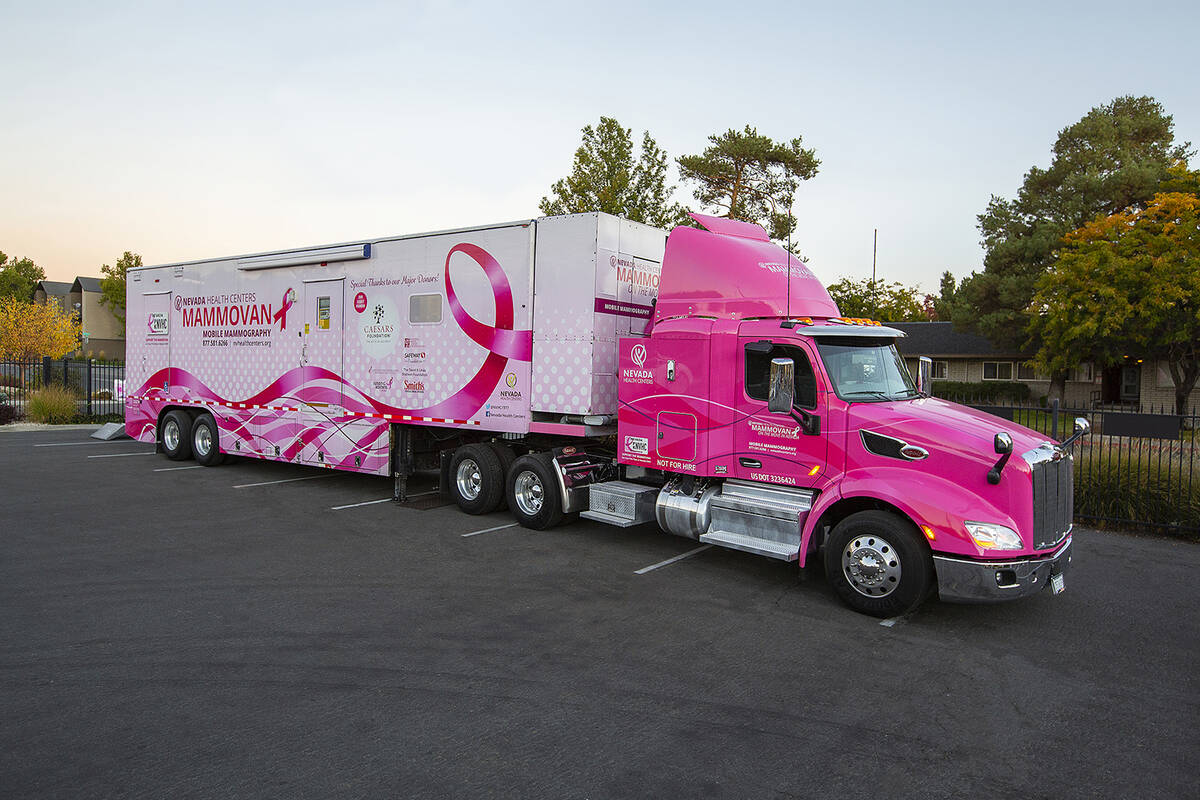Mammovan provides mobile mammograms to women in Nevada
There’s no excuse not to get a mammogram, especially since the Mammovan offers mobile mammography throughout Nevada.
Operated by Nevada Health Centers (a nonprofit, federally qualified community health center dedicated to providing access to quality health care throughout Nevada since 1977), the bright pink Mammovan provides mammograms to women in geographically isolated areas, as well as those who are uninsured and may not otherwise have plans to get this vital screening.
No newcomer to Nevada, the Mammovan has been in operation since 2000 after former Sen. John Ensign and former First Lady of Nevada Dema Guinn secured a grant to fund its startup. The traveling medical office, which offers the same services as a brick-and-mortar location, was immediately welcomed.
Since 2008, the current vehicle has covered more than 297,000 miles during its continuous trips around the state. The endeavor isn’t cheap by any means; the Mammovan costs approximately $1.2 million annually to operate, and its wear and tear is also costly.
“The Mammovan operates because of grant funding and community support,” said Rhonda Johnson, program manager for the Mammovan. “We also receive $25 from each breast cancer ribbon license plate sale from the Nevada Department of Motor Vehicles.
“Women don’t always prioritize their own health, but having this convenient option provides additional opportunities so they can be more actively in tune with their own bodies. It’s very important in the rural areas, where there are not often providers that offer these services.”
Self-care is critical but sometimes women create their own barriers by not prioritizing it. For Mammovan patient Charlow Peterson, it started when she told a friend she had some lumps that were irritating her left breast.
“I was hesitant because I don’t have insurance and was afraid of the cost,” she said. “My friend told me to call my primary care doctor and see who provided services that might help me.”
As an already established patient at Nevada Health Centers, Peterson recalled seeing a Mammovan poster at the clinic.
“When I called to inquire, the woman on the phone told me not to worry — that she would help me get my screening and I didn’t need to stress about the cost; there were donors who make these services possible.”
Peterson said when she initially walked into the Mammovan, she saw the names of the donors engraved into the leaves of the tree replica inside.
“I wept with gratitude because that made these people seem so real and generous,” she said
“I’m not sure why I put off getting a mammogram for so long,” Peterson said. “Honestly, I think it was just because I felt physically fit and healthy. The procedure itself was quick and painless, and the technician was kind and gentle. A few weeks later, when I got the call that I had triple-positive breast cancer, I couldn’t believe it.”
The original lumps Peterson had felt weren’t even cancer — just calcifications.
After a double mastectomy and reconstructive surgery, Peterson went through chemotherapy, too.
“I just want to encourage people to get their mammograms. If I hadn’t had the discomfort, who knows what I would be dealing with today, she said. “I just didn’t know there were services out there to help someone like me.”
Mammovan’s services are provided to all women, regardless of their economic status. While some women may be eligible for a screening at no cost, other payment methods include Medicaid, Medicare, insurance and a sliding fee scale.
According to the American Cancer Society, one in eight women will be diagnosed with breast cancer in their lifetime. But, because of women getting timely breast cancer screenings, 95 percent of those women will live beyond five years. The earlier cancer is detected, the more life a woman will live and with less invasive intervention.
There are racial disparities when it comes to who is actually getting mammograms. While white and Hispanic women each account for roughly 41 percent of Mammovan’s screenings, Black women account for only 6.61 percent of said screenings.
That delay in early screenings results in more late-stage cancer diagnoses. That isn’t just a Nevada problem — the state’s statistics mirror the national ones when it comes to Black women. To read about other Nevada breast cancer statistics, visit nevadacancercoalition.org.
“My message for all the beautiful women out there is to make themselves a priority, because early detection is so important,” Peterson said. “Ladies, if you’re over 40, please go in for this quick 20-minute appointment. I’m grateful to be here today to share my story and I’m hoping to make a difference for others so, please, don’t wait. Do it for yourself and for your loved ones — schedule your mammogram, today.”
Johnson agreed. “One of the best things you can do for yourself is to get screened,” she said. “Early detection is a key element in the fight against breast cancer.”
The Mammovan has returned to its pre-pandemic number of screenings. The convenience of the mobile unit allows women over 40 access to its services but will also screen women under 40 with a physician’s referral. Additionally, the van has the capability to conduct 3D screening, combining multiple breast X-rays to create a three-dimensional picture of the breast.
Scheduling a mammogram is easy: Simply call 1-877-581-6266 and press Option 1 after consulting the Mammovan’s schedule to make an appointment near you. To see where the Mammovan will be, visit www.nevadahealthcenters.org/mammography.
Ways to help Mammovan
• Purchase a Breast Cancer Awareness license plate from the Nevada DMV (dmv.nv.gov/platescharitable.htm)
• Use social media to encourage family and friends to get screened – Tag, You're It (www.nevadahealthcenters.org/tag/)
• Donate directly to the Mammovan because even a small amount has a cumulative effect. (www.nevadahealthcenters.org/donate_TYI/)

















